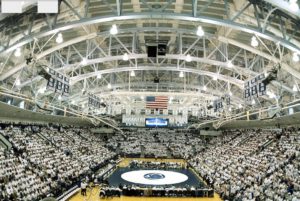
Courtesy of John Harrison
Rich, your career as both a wrestler and coach at Penn State is a tremendous source of pride to everyone associated with Penn State athletics. Your record speaks for itself and more importantly, the influence on the young people you’ve touched is immeasurable!
This quote from “Pennsylvania Wrestling Roundtable” pretty much sums up anyone’s feeling who has ever interacted with former Nittany Lion wrestler and head coach Rich Lorenzo.
Some of Rich’s accomplishments:
- Two-time District Champion
- New Jersey State Runnerup, 141 pounds
- Three year starter for Penn State
- Undefeated in dual meets junior/senior years
- 1968 EIWA Champion and Outstanding Wrestler
- 1968 NWCA All-Star Classic participant
- 1968 NCAA All-American (fourth at 190)
- Assistant coach at Penn State, 1968-1974
- Head wrestling coach at Penn State, 1978-1991
- Career record 188-64-9
- 11 Eastern League Championship teams
- EWL Coach of the Year, 1981-84, 87, 91
- Four teams finished in NCAA top three
- Produced 53 All-Americans and five NCAA champions
- Two-time National Coach of the Year
Rich, what have you been doing since you retired as head coach of the Penn State wrestling program?
I retired after the 1992 season and I continue to teach at Penn State. This is my 31st year in the Department of Exercise and Sport Science. I teach 12 activity classes a week. Up until 1996 I was the athletic building coordinator for White Building, then in 1996 I became Rec Hall athletic building coordinator. I have also spent alot of time with the National Wrestling Coaches Association. Coach (Bob) Bubb from Clarion and I both retired the same year and we both volunteered to help make the NWCA a more professional organization and get it more organized to be able to better represent the sport of wrestling nationwide. That involved about 30-40 hours a week for me during a five-six year time commitment. Coach Bubb and I put alot of sweat and blood into that endeavor, but it was for a good cause: trying to better the sport of amateur wrestling. I met many great people and we started to get it moving in the direction it needs to go. Now we need to employ full time people there, not just rely on volunteers, if we want to move in the direction of the football and basketball associations. I also worked wrestling camps up until the 1996-97 season. And last but not least I love spending time with my family-my wife and two children (seven and ten).
Rich is the reason why I decided to attend Penn State. I knew on my recruiting trip that he was a class act because he cared about Penn State’s reputation and his wrestlers. Rich always made time for us when we needed his advice and always stressed the importance of hard work and sacrifice. Winning was very important to him, but he always placed a high priority on academics as well. Without question, Coach Lorenzo earned respect from anyone he had interactions with.
-former Penn State wrestler and national champion, Carl DeStefanis
What are your best memories from the years you spent as a Penn State wrestler and coach?
My best memories are without a doubt the people that I was associated with both as a wrestler and a coach. I’ve been around alot of really great people, great role models. As a coach I’ve seen quite a few great competitors, coming from all different angles; some wild, some reserved but all unique individuals. To me the people are what it is all about. I’ve had the marvelous opportunity to meet alot of our fans, supporters and parents; that has been such a unique experience that I wanted to share that experience with everybody. That is why we started our wrestling clubs and why we have many of the functions and gatherings, because there are so many sincere and interested people out there who love PSU wrestling and follow it very closely. It’s just neat to let the kids see that when they are competing and training. It’s also great to watch the fellowship which results from getting these good people together.
Coach Lorenzo ran a first class program and was one of the most respected coaches in the history of collegiate wrestling. He taught me many lessons about wrestling which are also lessons of life.
-from Wrestling: A Commitment to Excellence by former Penn State wrestler and three-time All-American, Ken Chertow
Rich’s leadership was classic. He taught me structure but what he really impressed upon me is that humility is a virtue. I am glad to have been part of the Lorenzo era.
-former Penn State wrestler and four-time All-American, Greg Elinsky
I also really enjoyed the competition aspect as a wrestler and a coach. And I appreciated the opportunities we had then. But in three years of competition here I only had about 50 total matches and back then we didn’t wrestle anyone from west of the Mississippi, at least we didn’t travel there to wrestle them . As a coach I wanted to bring increased opportunity to the wrestlers. Now the team travels everywhere and the guys get (individually) up to 50 matches in a year.
Rich, how has the Penn State wrestling experience impacted your life?
It’s been my life. Even though I’m retired from wrestling, I live wrestling everyday. It’s been so important to me. People who say that wrestling is just a sport have never really done it or at least have never really gotten involved in it. Wrestling really becomes a big part of your life. It’s a great teaching tool for the lessons of life. It helps prepare people for successful professional lives; as a wrestler you learn the level of commitment and the sacrifices you need to make, and the focus and hard work it takes to succeed. You learn how to deal with confrontation, you learn not to be afraid of taking blame if you make a mistake; it’s like getting embarassed in a match or losing because you made a stupid mistake–you have the attitude that you will learn from making that mistake. It’s been an excellent tool for me in preparing myself for all the challenges I’ve had in my life–not only in my professional career here at Penn State but in my personal life, in my dealings with friends, with people in general. It’s something I hope goes on forever, the sport of wrestling, because it teaches such great values.
Rich Lorenzo is one of the finest people I have ever met. His main concern was to assist us in developing as individuals to become decent and productive members of society who are willing to accept responsibility for our actions. I am proud that I came from a program that produced outstanding wrestling with well founded priorities. Rich Lorenzo has shown that it is possible to excel while still maintaining integrity and class.
-former Penn State wrestler and National Champion, Scott Lynch
Rich Lorenzo was like a father, somebody that all the wrestlers respected. That is why we called him “Papa-Bear”. He instilled values and honesty and a great work ethic in us that is, to a degree, missing in today’s society. Much of what we learned from him is carried on with our families and in our interactions with the world.
-former Penn State wrestler and two-time All-American, John Hanrahan
How has wrestling changed since you were a wrestler at Penn State?
I think it’s getting better. I like the rules in the sport right now and have for the last couple of years. I wish we had the present rules back when I was a competitor. I think we have them pretty fine tuned now. We don’t need to encourage more aggressiveness or more pinning through the rules, instead that is a philosophy that coaches should have. I know many coaches have the philosophy “let’s win first” and that’s right, but there are also the important concepts of entertainment and interest to consider. It is possible to win yet be boring.
It’s tougher to compete today, but I won’t say that today’s champions are tougher than last year’s or last decade’s because I don’t think you can measure people that way. The championship caliber wrestlers from the years when I was a competitor and before would be successful today because they would make the adjustments and changes necessary to be successful.
Today’s kids are learning to wrestle at a younger age and the coaching has improved as far as the number of good coaches goes. There were great coaches back when I wrestled but there are definitely more now. There is also more opportunity now for wrestlers with the increased number of wrestling camps and clinics and the wrestling videos. These factors have all improved the sport of wrestling.
I was very fortunate to wrestle for Coach Lorenzo, and I personally believe “The Bear” was one of the best college wrestling coaches ever. It is difficult to specify what made him such a great coach because there are so many things that go into being one. Although he was a good coach on the wrestling mat, I think it was what he did off the mat that made him exceptional. I always thought and still do that he (and Coach Fritz and Coach Oishi also) worked harder, had higher standards, and cared more about my teammates and I than any other coach in the country.
Coach Lorenzo never talked about it, but when you wrestled for him or were otherwise close to the program, it was obvious the time and the effort that he put into the Penn State wrestling team. Even though there was always a lot of talk about how hard some programs and coaches in this country were working, none of them ever worked any harder, had higher standards, or cared more than he did. The difference was that he just did it, but they did it and also felt the need to tell everybody about it.
-former Penn State wrestler, two-time All-American and current PSU assistant coach, Dave Hart
What advice do you have for collegiate wrestlers today?
The advice I have is the same I’ve given to my kids and the same as was given to me. There are no shortcuts if you want to be successful. You’ve got to pay a price, you have to make the commitment, work hard, have faith, focus and intensity. It’s a whole lot easier if you’re doing it for yourself and for the right reasons. To me, you need to be a winner everyday and you can control that by doing your very best, by pushing yourself to the limit, by setting goals and always striving toward them. Whether you’re a varsity or junior varsity wrestler is not the message. The message is that you get the most out of yourself by good honest hard work and commitment. The traits you develop as a wrestler can then be applied to make you successful in life. These are the traits that I think we’ve done a good job developing in our wrestlers at Penn State. When a kid incorporates our philosophy as his own he will reap benefits not only on the mat but in and for the rest of his life. That is why I say that wrestling is not just a sport but a way of life.
Thanks Rich!

